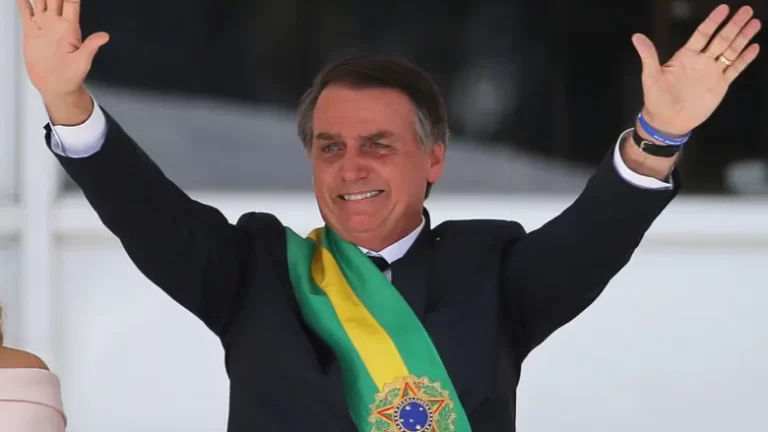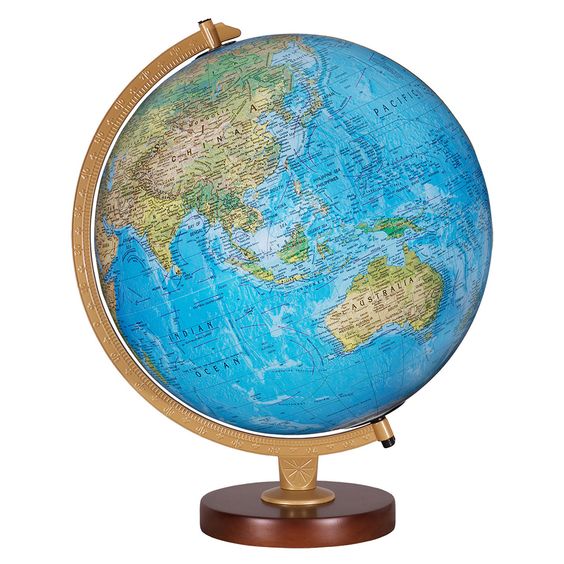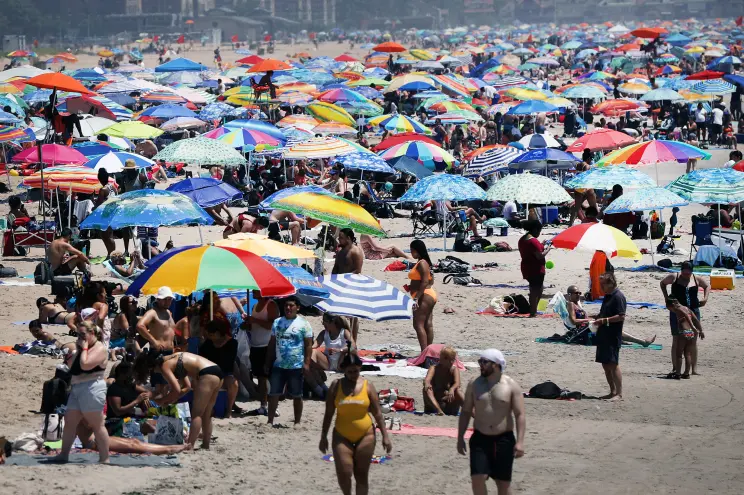
Presidential elections are scheduled for 2 October and far-right Bolsonaro is trailing well behind his socialist rival Luis Inacio Lula da Silva. He claims elections will be a fraud.
By Tom Arms
They call him “The Trump of the Tropics.” The parallels between Brazil’s President Jair Bolsonaro and Donald Trump are legion, with one big difference—Bolsonaro is better placed to overturn his country’s democracy.
Presidential elections are scheduled for 2 October and far-right Bolsonaro is trailing well behind his socialist rival Luis Inacio Lula da Silva. So what does he do? He pulls a Trump. The elections will be a fraud, Bolsonaro claims months before the polls open. The electronic voting machines, he says, have been hacked.
Rubbish, counters the electoral authority, who maintain that there have been no incidences of widespread fraud in any elections since the system was introduced in 1996, including the election which put Bolsonaro in office in 2018.
But Bolsonaro persists. This week, the Brazilian leader summoned diplomats to the presidential place to listen to an hour-long televised harangue in which he claimed – without evidence–that a military investigation into a voting system which the country has successfully used for 25 years was fraudulent. The investigators, by the way, were appointed by Bolsonaro.
The US embassy in Brazil immediately issued a statement describing Brazil’s election machinery “as a model for the world.” Last month, Joe Biden dispatched CIA Director William Burns to tell Bolsonaro to change his story. The US president is clearly worried that a successful Bolsonaro coup in October will give encouragement to the supporters of Trump’s “Big Lie.” Bolsonaro has gone on record to say that Biden’s election was “suspicious.”
Trump said: “Brazil is lucky to have a man such as Jair Bolsonaro working for them. He is a great president and will never let the people of his great country down.”
Bolsonaro is by general consensus a far-right populist president. He opposes abortion, same-sex marriage, gays in general, immigrants, drug liberalization, gun control, land reforms, secularism and affirmative action. He has rolled back legislation to protect the indigenous people of the Amazon and 1,330 square miles of the vital Amazon rain forest has been lost to development during his presidency. Bolsonaro’s supporters are the military, big business and gun-toting evangelical Christians who represent a solid base of roughly 25 percent of the population.
The former Captain in the Brazilian army claims that the military dictatorship from 1964 to 1985 was a “glorious period” in his country’s history and has described the former regime’s chief torturer as a “national hero.”
But none of the above is the reason for his dramatic drop in the opinion polls. That is the result of his complete mishandling of the covid pandemic. At 600,000 bodies Brazil has the second-highest death rate in the world (America is tops). Bolsonaro consistently played down the threat; fired two health ministers who opposed him; blocked state governors who tried to circumvent his non-action policies; refused to wear a mask; promoted debunked drugs and opposed a vaccination program.
His performance was so appalling that a committee of the Brazilian Senate has called for him to be charged with crimes against humanity and an interesting allegation of “charlatanism.”
Bolsonaro claims he was standing up against the forces of “political correctness.”
The Brazilian leader’s performance in opinion polls—and the October elections—is likely to be immaterial. He has the military behind him. Bolsonaro has made a point of raising the army to the pedestal from which it fell in 1986. Military figures have been appointed to key cabinet posts and his running mate is army general Walter Bragge Netto.
Donald Trump had the support of a motley crew of gun-toting White Supremacists to fight for his big election lie. Bolsonaro has the backing of the Brazilian equivalent of the Proud Boys but behind them is the 334,500-strong army.
 World Review
World Review
- Europe is burning sounds like the title of an apocalyptic Hollywood blockbuster. Unfortunately it is an accurate newspaper headline as the continent this week sweltered in record temperatures. In normally temperate Britain the thermometer topped 104 farenheit. In Spain it reached 109. Spontaneous fires were widespread. The London fire brigade reported its busiest day since the Blitz. Grass and forest fires broke out in France, Spain, Portugal, Greece and Italy. In Greece alone there were 390 forest fires in one week. The high pressure system responsible for the heatwave is now over Poland and is expected to continue eastwards reaching China in August before eventually being cooled down by the Pacific waters. This follows record temperatures in the Middle East and South Asia and forest fires in California, the Pacific Northwest, Canada and Australia. Climate change scientists say: “Get used to it. This is a taste of things to come.”

Heatwave in Europe - Joe Biden—America’s 79-year-old president—has covid. It is not surprising. In fact it would be more surprising if he didn’t. Covid has dropped out of the US headlines but not off the health charts. As of Friday nearly a third of the American population—91,767,460—have had a confirmed case of coronavirus. 1,050,702 of them have died, including 592 of them this Wednesday alone. America decided months ago to stop the mandatory wearing of face masks and social distancing and reduced pressure for vaccinations. They were going to learn to live with covid to save the economy. Since then the number of cases has risen dramatically. The increase in coronavirus cases has not been confined to American shores. Other countries governments are also treating the pandemic as more or less done and dusted. But there have been significant increases in confirmed cases and deaths in Britain, France, Belgium, Germany, India, Greece, Japan, New Zealand, Singapore…. Someone obviously forgot to tell the virus that it was time to pack up.
- There is no love lost between Japan and South Korea. In fact, there has been pretty much a hate-hate relationship ever since the Japanese warlord Toyatomi Hideyoshi raped and pillaged his way across the Korean peninsula in the 16th century. In modern times, Japan occupied Korea from 1910 to 1945 and during the World War Two enslaved an estimated 150,000 Koreans as “comfort women” (a euphemism for prostitutes) and 1.2 million Koreans as forced laborers in mines and factories. During the postwar years there have been various attempts to heal the rift but the Koreans have been slow to forgive and the Japanese have been slow and half-hearted in their apologies. This week has seen another attempt at rift-healing between two of America’s closest and most prosperous Asian allies. The two countries foreign ministers—South Korea’s Park Jin and Japan’s Yoshimasa Hayashi—met in Tokyo for another attempt at rapprochement. The immediate catalyst was South Korea’s move to sell the assets in Korea of Japanese multinationals Nippon Steel and Mitsubishi Heavy Industries, to compensate the wartime forced laborers. This is a very real issue but perhaps the more pressing spur is the need to unite against the nuclear threat from North Korea, the Russian threat in Ukraine and the rising power of China.
- The next Prime Minister of Italy is tipped to be the 45-year-old leader of the far-right Brothers of Italy Giorgia Meloni. If the bookies are right the result could be a major shift in Italian and EU policies. Ms Meloni’s possible route to the top has been cleared by the resignation this week of Prime Minister Mario Draghi after his financial package was blocked by right-wing parties. The Brothers of Italy are what might be termed your typical European far-right populist party. For a start they are Euro-skeptic. The dream of a federal Europe is not their vision. They want a confederal “Europe of Nations.” They advocate zero-tolerance of illegal immigration and want to block Italian ports to prevent migrants from crossing the Mediterranean to Italy. To ease the need for migrant workers, the Brothers of Italy propose measures to increase the birth rate. All of the above would put the EU’s Schengen Agreement and its rules on free movement of labor in doubt in Italy. Ms Meloni started off pro-Russian but since Putin’s invasion of Ukraine has reversed her party’s position. However, she is unlikely to follow Mario Draghi’s role as the EU’s leading advocate for Ukraine. The Milan Stock Exchange dropped two percent when Draghi’s resignation was announced.
- Kyiv’s police are, not surprisingly, having problems, its chief General Andriy Nebitov this week told a packed meeting of the National Liberal Club’s Security and Defense Council. The Russians, he reported, have made a point of targeting police stations and facilities. The result is that the city and region’s cctv network has been virtually wiped out. Police stations have been destroyed and they need cars, cameras, computers and electricity generators. In the first few months of the war, said Gen. Nebitov, there was a problem with looting. 1,100 people were arrested. Now the problem is with organized criminals (mainly Turkish) forcing women refugees into prostitution. Kyiv police are also heavily involved in investigating Russian war crimes. So far 43 Russian troops have been charged. “In Kyiv region,” said Gen. Nebitov, “we have a key role because in the East the Russians have destroyed the evidence.” Meanwhile, Russian Foreign Minister Sergei Lavrov has been expanding Moscow’s territorial ambitions. He said this week that peace talks were currently “impossible” and that Russian “geographical tasks” had moved beyond the Donbas Region to encompass the Kherson and Zaporizhia regions and “a number of other territories.” Lavrov of course blamed the West for the strategic change and said Russia would continue to expand its operations and ambitions as long as the West supplied Ukraine with long-range weapons.
- The EU on Thursday heaved a sigh of relief—for now. Russia re-opened its Nordstream 1 gas pipeline after ten days of “maintenance work.” Virtually no one believes the vital gas link was shut down for repairs. It was a clear warning from Moscow to Brussels to soften their pro-Ukrainian stance or face the energy consequences. To drive the point home, the resumed supplies are at reduced capacity. In the meantime, EU Commission President Ursula van der Leyen was this week in Azerbaijan in search of alternative energy supplies. The Trans-Caucasian country is steeped in oil and gas. In fact, at the start of the twentieth century it was producing half of the world’s oil. But it has a problem. Azerbaijan is landlocked. So the all of its fossil fuels are exported through pipelines. At the end of 2020 Azerbaijan opened a new gas pipeline which stretched all the way to Italy. This week Ms van der Leyen signed a deal to double the amount of gas pumped from Azerbaijan. Unfortunately, that is only ten percent of the 155 billion cubic meters a year which is imported every year from Russia. So, the EU is frantically looking elsewhere. German Chancellor Olof Scholz was recently in Senegal to urge the Senegalese to increase production and Italian diplomats have been leaning hard on Algeria, Angola and the Democratic Republic of the Congo. Qatar, the UAE, Saudi Arabia and even Israel have also been pressed.
__________________
 Tom Arms is Foreign Editor of Liberal Democrat Voice and the author of “America Made in Britain.”
Tom Arms is Foreign Editor of Liberal Democrat Voice and the author of “America Made in Britain.”